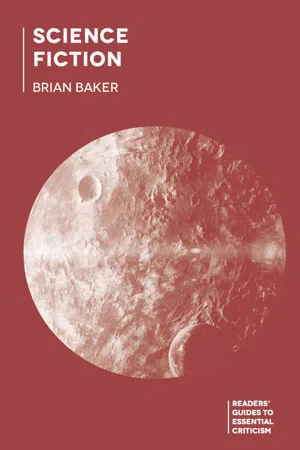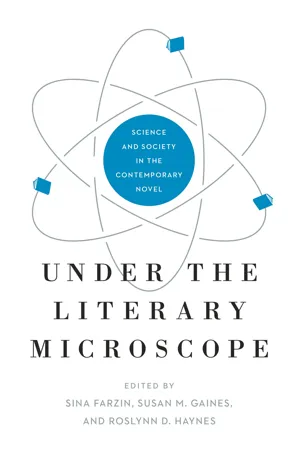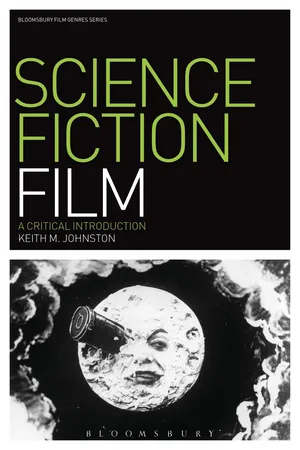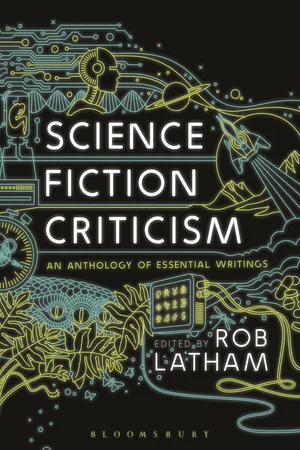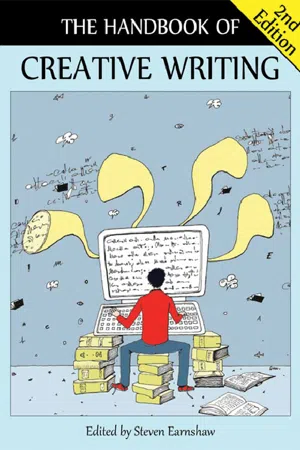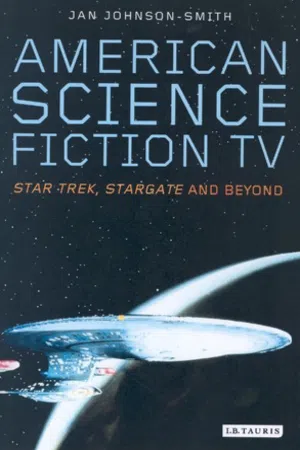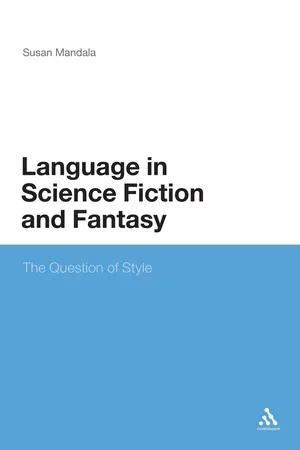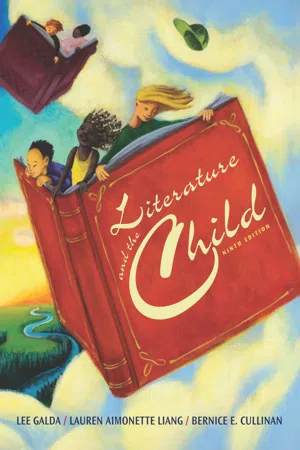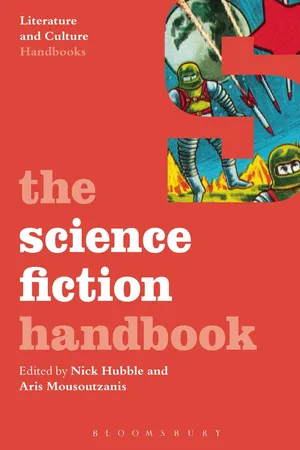Literature
Science Fiction
Science fiction is a genre that explores imaginative and futuristic concepts, often incorporating scientific and technological elements. It typically takes place in a future setting or in an alternative universe and often deals with the impact of these advancements on society and individuals. Science fiction literature often delves into themes such as space exploration, time travel, and the potential consequences of scientific and technological progress.
Written by Perlego with AI-assistance
Related key terms
1 of 5
11 Key excerpts on "Science Fiction"
- eBook - PDF
- Brian Baker(Author)
- 2017(Publication Date)
- Red Globe Press(Publisher)
CHAPTER ONE Definitions: What is Science Fiction? W hat is Science Fiction? That seems to be an easy question to answer. Science Fiction (SF) is a literary mode that deals with spaceships. Or aliens. It’s about the future. Or, it’s about technology. There might be some science in it. (Or there might not.) Wait. What is Science Fiction? That seems to be an impossible ques- tion to answer. We might know it when we see it, but what makes it different from fantasy? Or from the Gothic? Or from satire? ‘What is sci- ence fiction?’ is an impossible question, impossible because unanswer- able, though many have tried, critics, writers and readers alike. A genre, a mode, a collection of different sub-genres, a thought-experiment, a way of conceptualising the future of human beings themselves, a waste of time, or just ‘pulp’, cultural trash? I have often asked my own stu- dents to define Science Fiction, at the beginning of a course on the genre, and they have produced many thoughtful responses: New and strange points of view, imaginatively created, containing poten- tial or impossible scientific theories. A genre concerned with ideas of technology and imagined visions of the future, set in an unknown or alien environment, and often serving an allegorical purpose, commenting upon the society in which it was created. A rationally extrapolated genre where imaginary worlds and realities are creatively constructed in order to explore abstract concepts. These are all reasonable definitions. They tend to contain elements that emphasise science or reason; the imagination; alternative worlds or soci- eties; and a definite relationship between the imagined world and ‘our’ own, the world that produced it. - eBook - PDF
Under the Literary Microscope
Science and Society in the Contemporary Novel
- Sina Farzin, Susan M. Gaines, Roslynn D. Haynes, Sina Farzin, Susan M. Gaines, Roslynn D. Haynes(Authors)
- 2021(Publication Date)
- Penn State University Press(Publisher)
8. The Science Fiction of Technological Modernity Images of Science in Recent Science Fiction Sherryl Vint As the name implies, Science Fiction (SF) is a genre that engages with science, although precisely what “science” means in this context has been a topic of considerable debate. The influential pulp magazine editor Hugo Gernsback named the genre in the 1920s, but much of the fiction he called SF—and much of what is still published under this label—might be better understood as futuristic or surrealistic rather than scientific. Gernsback did not invent the genre but coined a term that united several kinds of speculative writing— future war stories, scientific romances such as those by H. G. Wells, extrap- olations from science such as works by Jules Verne, and utopian fables—that had been in circulation since at least the mid-nineteenth century and were subsequently understood as part of the same genre.1 SF is perhaps best de- scribed as a literature that responds to how science and technology change human culture. In this chapter, I review how the historical relationship be- tween science and SF has changed, providing analyses from three of the genre’s most prevalent twenty-first-century preoccupations: artificial intelli- gence, genomics, and climate change. Science and Science Fiction in Historical Perspective Gernsback promoted Amazing Stories as a “new sort of magazine” that col- lected stories that were “interwoven with a scientific thread” and recognized the “entirely new world” produced by science and technology (1926, 3). “Our entire mode of living has changed with the present progress,” he opined, 176 Cause and Effect? “and it is little wonder, therefore, that many fantastic situations—impossi- ble 100 years ago—are brought about today” (3). His editorials—often pref- aced with “Extravagant Fiction Today . . . Cold Fact Tomorrow”—conveyed a sense of excitement about the new world that science was making possible. - eBook - PDF
Science Fiction Film
A Critical Introduction
- Keith M. Johnston(Author)
- 2013(Publication Date)
- Berg Publishers(Publisher)
Part I What is Science Fiction? This page intentionally left blank 7 –1– Genre, Theory and Science Fiction A definition of the Science Fiction genre from an academic perspective might focus on thematic areas around technology, science, futurism or the figure of ‘the Other’. An equally valid definition might come from popular identification of iconographic elements such as flying saucers, robots, ray guns and aliens. A third discussion of the term, from an industrial perspective, might focus on special effects or spectacle. Any attempt to understand the genre must engage with all three and accept that further viewpoints would be equally valid. However, academic and popular criticism, as well as individual audience groups, often desires limitations on genre, a set of rules or conventions within which films are, or are not, contained. Yet genres do not exist a priori ; they are not a natural phenomenon that can be precisely catalogued and labelled. Rather than pre-existing forms, genres are cultural creations that are formed and reformed on a regular basis, prone to shifts in emphasis and meaning. A genre definition such as ‘Science Fiction’ can be used regularly in film production (directors, producers or actors might refer to their project in generic terms); by film audiences (discussing whether they want to see a specific genre); within advertising materials (promoting elements that are seen as intrinsic to the genre); or by critics or academics reviewing or writing on the film or genre. In each instance, the exact definition of what each individual means by the term ‘Science Fiction’ is more fluid than traditional genre boundaries allow. Equally, their definition will be different from what a producer, audience member or critic might have meant by the term ‘Science Fiction’ ten, thirty or fifty years ago. - eBook - PDF
- Aleksandra Mochocka(Author)
- 2019(Publication Date)
- Peter Lang Group(Publisher)
Yet, even such a situ- ation fails to be meaningless. Cautious of the mechanical repetition of formulas that Science Fiction is able to perpetrate, Broderick (1995) admits that such liter- ature at the same time offers a disturbing portrait of humans at the mercy of their physical and cultural environment, shared in certain respects by poststructuralist analyses of the posthumanist condition, […] thus located within the traditional codes of sf construction. (p. 28) Broderick (1995) goes on to observe that the underlying message carried by such texts may be far detached from what might have been expected. The heavy anti- liberal weight of that kind of Science Fiction literature results from the fact that, as he has it, If the standard surface of sf is a curious blend of eighteenth-century mercantile liber- alism and militarist conservatism, made up often of tales of brilliant individualists eager to die for the flag, the subtext is as often one of the bleakest mechanical determinism and obliteration of the volitional subject. (Broderick, 1995, p. 28) It remains an open question if Science Fiction is subversive or sustains the ex- isting power structures. Either way, it cannot escape from being heavily charged with political meanings. In what has become the most acclaimed scholarly definition of the genre, Darko Suvin (2016a) characterises Science Fiction as follows: SF is, then, a literary genre whose necessary and sufficient conditions are the presence and interaction of estrangement and cognition, and whose main formal device is an imagina- tive framework alternative to the author’s empirical environment. (p. 20) He supplements this statement with the following observation: “SF is distin- guished by the narrative dominance or hegemony of a fictional “novum” (nov- elty, innovation) validated by cognitive logic” (p. 79). - eBook - PDF
Science Fiction Criticism
An Anthology of Essential Writings
- Rob Latham(Author)
- 2017(Publication Date)
- Bloomsbury Academic(Publisher)
And let me point out again (rather more enthusiastically than before) that some first-rate writing has emerged from this sort of forced marriage. (Perhaps the differ-ence between the work of a marriage broker and a shotgun wedding?) Stapledon’s Starmaker falls into this group, as well as Ray Bradbury’s (specifically) Science Fiction and a large proportion of both Utopian and anti-Utopian novels up through the turn of the century. 3. Speculative fiction: stories whose objective is to explore, to discover, to learn , by means of projection, extrapolation, analogue, hypothesis-and-paper-experimenta-tion, something about the nature of the universe, of man, of “reality.” Obviously, all fiction worth considering is “speculative” in the sense that it endeavors to reach, or to expose, some aspect of Truth. But it is equally true—and irrelevant—to say that all fiction is imaginative or all fiction is fantasy. I use the term “speculative fiction” here specifically to describe the mode which makes use of the traditional “scientific method” (observation, hypothesis, experimentation) to examine some postulated approximation of reality, by introducing a given set of changes—imaginary or invent-ive—into the common background of “known facts,” creating an environment in which the responses and perceptions of the characters will reveal something about the inventions, the characters, or both. It is in this last area that the essence of Science Fiction resides; it covers a great deal of territory, shading at either end into the first two categories. Clearly, there is hybridization all through the groups—as for instance in satire (such as The Child Buyer , or Player Piano ) whose main devil actually is some specific aspect of science or technology. For purposes of this discussion, I am not considering the space adventure story, the transplanted western or historical, as Science Fiction at all. - eBook - PDF
- Steven Earnshaw(Author)
- 2014(Publication Date)
- Edinburgh University Press(Publisher)
12 Writing Science Fiction and Fantasy Crawford Kilian Science Fiction and fantasy seem unlikely partners. SF, after all, is about what could happen, given what we currently know about the universe. Fantasy is about what could never happen, because science has shown it to be impossible. But science itself uses fantasy to make its points, and fantasy tries to work out its own implications in a consistent manner. Science imagines elevators that fall forever, and spaceships that display clocks running slower and slower as the ships near the speed of light. Fantasy imagines the logical consequences of a spell, and the ecological niche of dragons. These are all ‘thought experiments’, ways of using fantasy to look at the world and ourselves outside the limits of ordinary experience. Whether you write SF or fantasy, you are conducting such a thought experiment: could a human love a robot, and could the robot requite that love? If magic worked, what would it cost? In both genres, you are really exploring the human mind under conditions that reveal something new – or something old, familiar and ingrained that we have taken for granted until you make us look at it again. Just as some rocks and flowers reveal unexpected colours under ultraviolet light, human nature looks different in the light of a distant star, or of a sorcerer’s glowing staff. In this chapter I want to throw some light on the similarities of the two genres as well as their differences. This will involve their history, their conventions, and their future. But mine is just one writer’s view; I hope that your own vision of your genre will be far more imaginative and original than mine. Origins of Science Fiction and Fantasy Fantasy arises from myth, folk tale, and fairy story. It began as an effort to personify the mys-terious forces that rule our world: lightning, rain, sunlight, ice, and earthquake. - eBook - PDF
American Science Fiction TV
Star Trek, Stargate and Beyond
- Jan Johnson-Smith(Author)
- 2004(Publication Date)
- I.B. Tauris(Publisher)
C R E A T I N G W O R L D S A more practical approach is to simply ask what it is that helps us identify a story as ‘Science Fiction’. Every text has a fundamental need: regardless of its medium, it must quickly and efficiently establish a convincing and sustainable reality. Science Fiction’s alternative realities are created both in and through visual or verbal language: its imaginary worlds are initially formed in a manner identical to those of other genres. The difference is that in sf these worlds must also distinguish themselves from the realities of our everyday world by creating new or different rules by which their realities function. As Broderick reminds us, at the heart of reading is an act that helps to: create a world, built out of words and memories and the fruitfulness of the imagination. Usually, we miss the complexity of this process. Like poetry and postmodern fiction, sf tests the textual transparency we take for granted, contorting habits of grammar and lexicon with unexpected words strung together in strange ways. 19 This process is normally missed because the artifice involved in the means of relaying the message is concealed in many texts: the story takes priority over the style of the telling; the realist tendency means that the signifier is effectively effaced. The ambitions and lexicon of sf are in contrast with the central objectives of most other genres. For Delany, ‘mundane’ fiction generally proceeds: as a series of selections from a theoretically fixed, societally extant lexicon of objects, actions and incidents. In the s-f tale, a series of possible objects, possible actions, possible A M E R I C A N S C I E N C E F I C T I O N T V 2 0 incidents (whose possibility is limited, finally, only by what is sayable, rather than what is societal) fixes a more or less probable range of contexts for a new lexicon. - eBook - PDF
The Language in Science Fiction and Fantasy
The Question of Style
- Susan Mandala(Author)
- 2010(Publication Date)
- Continuum(Publisher)
The other worlds of Science Fiction and fantasy are interpreted as analogues of this one, and what happens there taken as a critique of what is happening here (Amis 1960/1963: 63; Hillegas 1971: 276; Hollinger and Gordon 2002: 4; Hunt in Hunt and Lenz 2001/2004: 8; Swinfen 1984: 2). As a number Science Fiction and Fantasy 13 of commentators have pointed out, the experiences of aliens, super-natural beings and humans in various kinds of other worlds serve to explore our often troubled relationship with difference, be it racial (Amis 1960/1963; Roberts 2006); sexual (LeFanu 1988; Moody 2000; Roberts 2006; Wolmark 1994); religious (Mendlesohn 2003: 268), or physical (see, for example, Robin Hobb’s treatment of obesity in The Soldier Son Trilogy, 2005–2007, and Stephen Donaldson’s use of lep-rosy in Lord Foul’s Bane , 1977). It has also been noted that Science Fiction and fantasy can be important barometers of various kinds of social fear. Fantasy’s ‘supernatural terrors’, as Parkinson (1987: 89) notes, often represent actual terrors, such as the fear of social and moral chaos (Zanger 1982: 230), the fear of evil (Drabble, ed. 2000: 351), and the fear of addiction, as Shippey (1982: 106) has argued with reference to Gollum’s need for the ring in The Lord of the Rings , and Chadbourne (2008: 10) has suggested of Moorcock’s Elric, who depends on his demonically possessed sword in the same way an addict does a drug. Auerbach (1997) analyses the sub-genre of vampire fantasy fiction as a literature of social fear – the fear of the unknown, the fear of losing control, the fear of disease, the fear of urban gangs. Science Fiction, of course, is frequently associated with fears relating to the use of science and technology (Amis 1960/1963; Clarke 1979; Delany 1968/1977: 200; Hillegas 1971; Hollinger 1991; James 2003; Luckhurst 2005; McCaffery 1991; Roberts 2006; Rose 1981; Seed 2004), and this concern, while less salient in fantasy, is far from absent. - eBook - PDF
- Sibylle Baumbach, Lena Henningsen, Klaus Oschema, Sibylle Baumbach, Lena Henningsen, Klaus Oschema(Authors)
- 2017(Publication Date)
- Palgrave Macmillan(Publisher)
Pointedly put, there is a zone of indeterminacy between today’s hard Science Fiction and the speculative scientific writing of, for example, research and development departments of big technology corporations. 278 K. WIEGANDT By this token, futuristic anticipation reveals that extrapolating is a fic- tional device and ideological horizon” (Suvin 1979: 28) rather than scientific prediction. Especially from the late 1930s on, Science Fiction developed towards narratives where the disruptive invention eliciting a sense of wonder is only the starting point for an inquiry into the conse- quences of the invention (Mendelsohn 2003a: 4). Shifting from a model in which the future is deduced from the invention to a model in which the invention enables manifold equally possible developments, Science Fiction has moved from science into the sphere of anthropological and cosmological thought (Suvin 1979: 12). This development suggests that although thought experiment and invention have remained sources of fascination, Science Fiction must have tapped other sources to continue to fascinate its readers. At least as fascinating as Science Fiction’s tenuous futurological quali- ties, I argue, are the genre’s possibilities of addressing the present through allegory, that is, through an extended metaphor whose details the reader gradually learns to interpret as corresponding to the details of some other system of relationships while simultaneously keeping their literal meaning in mind. When Science Fiction reflects present scenarios back to us in de-familiarised forms, it can fascinate us by trapping us in a double vision of conflicting timescapes, prompting us to decode analo- gies between future narrative and present experience, and to make sense of the differences that become visible against the background of these analogies, even while we continue to interpret its future world as just that: a possible world, actually existing in the future. - eBook - PDF
- Lee Galda, , Lauren Liang, Bernice Cullinan, Lee Galda, Lauren Liang, Bernice Cullinan(Authors)
- 2016(Publication Date)
- Cengage Learning EMEA(Publisher)
In both genres we find many excellent stories that are well written, present multidimensional charac-ters engaging in exciting plots, and contain profound Summary 243 Copyright 2017 Cengage Learning. All Rights Reserved. May not be copied, scanned, or duplicated, in whole or in part. Due to electronic rights, some third party content may be suppressed from the eBook and/or eChapter(s). Editorial review has deemed that any suppressed content does not materially affect the overall learning experience. Cengage Learning reserves the right to remove additional content at any time if subsequent rights restrictions require it. 244 CHAPTER 7 F A N T A S T I C L I T E R A T U R E : F A N T A S Y A N D S C I E N C E F I C T I O N themes. Fantasy often presents heroes on a quest to achieve a goal as well as discover personal identity. It may contain fully developed fantasy worlds and magic. It may be set in our world and include magic realism. Often, animal characters act as humans or miniature beings reflect human activity. Science fic-tion is set in the future with characters who must learn to live in difficult circumstances, situations brought about by the results of scientific advance-ments. Fantastic literature offers young readers the opportunity to think about choices, actions, and con-sequences at a profound level. The following Booklist contains both fantasy and Science Fiction titles that represent both the older, “clas-sic” stories and those newer works that are popular with today’s young readers. With few exceptions, we have listed only one book per author; many have multi-ple books and extensive series. Most of the books men-tioned within the body of this chapter are not listed in the Booklist, which is meant as a supplement to those titles. The Booklist is not marked for diversity because most books go beyond the boundaries of the way we think about diversity and, for the most part, consider themes that relate to diverse cultures and people. - eBook - PDF
- Nick Hubble, Aris Mousoutzanis, Nick Hubble, Aris Mousoutzanis(Authors)
- 2013(Publication Date)
- Bloomsbury Academic(Publisher)
Implicit to this proposition, which comes at the beginning of a book about SF, is that imaginative fiction is one of the tools by which people uncover and understand the coming future. In the same manner that Georg Lukács, the Hungarian Marxist literary critic, wrote The Historical Novel , analysing examples from the genre of the historical novel in order to show what they revealed about the prehistory of society, Jameson analyses SF from its emergence in the late nineteenth century in order to reveal its Utopian dreams of the future. Both genres represent what Jameson describes as ‘the emergence of a narrative form peculiarly restructured to express [a] new consciousness’ (284). He goes on to note the fact that this emergence of SF in the late nineteenth century coincides with the decline of the historical novel, leading him to conclude: We are therefore entitled to complete Lukács’s account of the historical novel with the counter-panel of its opposite number, the emergence of the new genre of SF as a form which now registers some nascent sense of the future, and does so in the space on which a sense of the past had once been inscribed. (285–6) However, a sense of the future is not the same thing as the future itself: ‘the most characteristic SF does not seriously attempt to imagine the “real” future of our solar system. Rather […] [it] transform[s] our own present into the determinate past of something yet to come’ (288). Therefore, as Orwell saw, what was important about Wells was not the specifics of the future he portrayed but rather the fact that his fiction apprehended the present as history, which was soon to be bypassed. This sense that our lives are being lived in relation to the birth-struggles of a better future is a staple of Utopian literature from Wells and his British successor, Olaf Stapledon (see entry in Chapter 3), through 1970s novels such as Marge Piercy’s Woman on the Edge of Time (1976) and Joanna Russ’s The Female Man (1975), and
Index pages curate the most relevant extracts from our library of academic textbooks. They’ve been created using an in-house natural language model (NLM), each adding context and meaning to key research topics.
